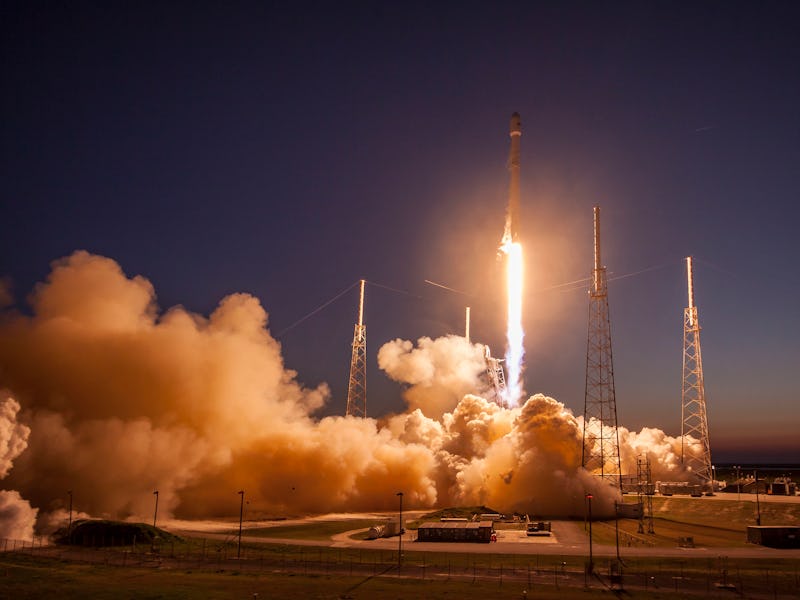3 Reasons Why SpaceX and Tesla Won't Merge
Some things just aren't meant to be.

During Tesla’s most recent earnings call, one investor posed an interesting question: What if Elon Musk’s Tesla merged with Elon Musk’s SpaceX? Given Tesla’s acquisition of Solar City, another Musk company, it didn’t seem that unlikely.
Of course, Musk said no, because, there’s not “a strong rationale” to combine the two, and the relationship “is really quite tenuous” for SpaceX and Tesla to “merge into one entity.” Plus, any savvy CEO would avoid such big news on an earnings call, anyway.
There are a few very good reasons why Tesla and SpaceX would never merge, but we asked Jess Leyva, an engineer who has worked on projects for NASA and the Department of Defense, to explain exactly why you just won’t see this Musk merger.
The Soyuz rocket lifts off from Europe's Spaceport in French Guiana on its mission to place the second pair of Galileo In-Orbit Validation satellites into orbit, on October 12, 2012. Galileo will become fully operational by 2020 and intends to give Europe full independence from the U.S., Russian and Chinese controlled GPS systems.
1. Creating a custom GPS network is prohibitively expensive
There’s a reason why governments are the only entities that provide GPS. It cost billions and took years of investment to get the GPS coverage we have today. The United States and Russia were the only suppliers of satellite-based navigation for years, until China and the European Union started sending their own navigation satellites into space in the 2000s.
In the latter’s case, only 14 of the 24 satellites are in orbit and it will cost nearly $8 billion, Space Flight Now reports.
Building or commissioning the 24 necessary satellites and launching them into orbit wouldn’t be economically feasible for Musk’s cash-strapped companies.
“There are many, many problems that can be solved if enough money is brought to the table to solve them,” Leyva tells Inverse. “But the reason we have existential problems is because it takes either a very clear profit motive for industry or, for a government agency, a huge threat.”
Also, GPS isn’t all that accurate. The U.S.’s GPS system of satellites is only accurate between three to 10 meters. That’s hardly the type of accuracy to justify $8 billion.
The vast majority of people who use GPS need ground-based satellites to boost the signal when they are in canyons of skyscrapers.
2. More accurate location data requires ground support
Launching satellites into space isn’t enough. The most accurate GPS measurements come from grounded GPS augmentation methods like Doppler GPS, Differentiated GPS, and real-time kinematic positioning.
The autonomous Teslas that Musk plans to deliver will need accurate positioning data. In order to make a GPS satellite investment useful, the company would also have to invest large, expensive reference towers to continuously filter data to and from the GPS satellites and then back to the vehicle using the navigation service. Those towers would need to be built along major highways and city centers.
“In a large metropolitan area you’ve got other problems, like the fact that 99 percent of your market is in a canyon of buildings,” Leyva says. “That’s one of the limitations in serving urban areas, because they’re deep out of reach of typical GPS data, so you’ve got to augment that with local fixes.”
A Tesla model S sits parked outside of a new Tesla showroom and service center in Red Hook, Brooklyn. Teslas are wired with AT&T-backed connectivity in 2013.
3. Wireless companies can provide better, cheaper internet than satellite internet
Teslas have relied on internet service since Tesla equipped the Model S with AT&T-backed connectivity in 2013. The latest models now run 4G/LTE. Yet while Musk generally prefers to keep things in-house — take the Gigafactory’s in-house battery production — providing Tesla-run satellite internet through SpaceX-launched satellites feels
Verizon and AT&T’s grounded cellular towers cover huge swaths of the country, and competition for the best coverage between phone companies ensures that it will keep improving. It’s not perfect, Leyva says, but it’d be hard for a newcomer.
The alternative is satellite internet. Satellite internet is one of those things that you probably only know about if you live in a rural area where nothing else is available. It’s a lot slower, is affected by weather, and can lose connectivity pretty easily. Airplanes use it and it works well enough, but it’d be a bummer to lose internet connectivity while driving your Tesla through a long tunnel, especially after the company dropped enough cash on providing satellite internet to repeatedly fill a Falcon 9.
In short, Musk’s assertion that there is simply not a “strong rationale” boils down to the fact that there’s hardly a reason to spend billions of dollars when long-established companies have already made the investment to provide the same services on the cheap.